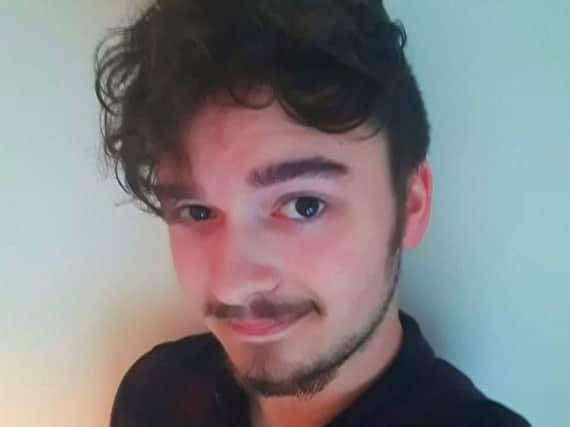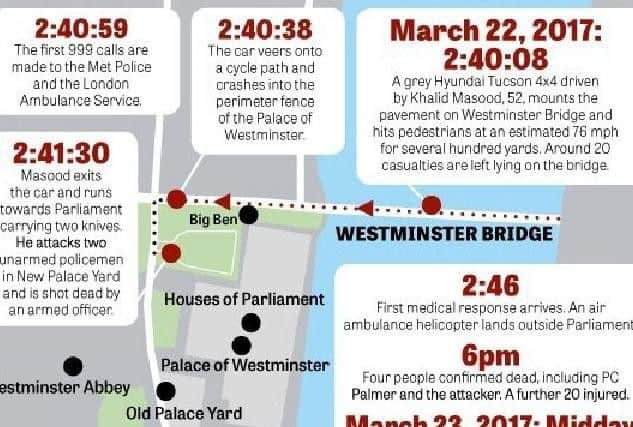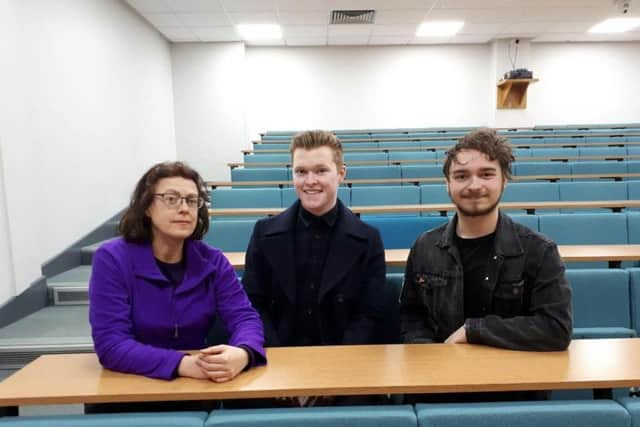Lancashire survivor of Westminster Bridge attack reveals harrowing details one year on


Owen, 19, a politics and history student at Edge Hill University, was on the bridge when terrorist Khalid Masood drove his van at pedestrians in a murderous rampage.
Moments later Masood,52, abandoned his vehicle after crashing into a fence and ran into New Palace Yard where he stabbed unarmed police officer PC Keith Palmer to death. He was later shot by an armed police officer.
Advertisement
Hide AdAdvertisement
Hide AdOwen and several of his fellow students were injured in the attack which left five dead and 45 other people hurt.


Photos of Owen’s bandaged, blood-spattered face have become one of the enduring images associated with the horrific attack.
The 19-year-old from Morecambe, said: “I am very lucky to be alive. It could have been a different story.
“It sort of changes your whole perspective on the world. This whole catastrophic event has happened to you. You certainly don’t take things for granted any more or the people you meet in your life.”
Advertisement
Hide AdAdvertisement
Hide AdFor many hours he feared two of his friends had died in the attack, but later learned they had escaped harm and got off the bridge.


A committed Liberal Democrat, he says the events have also charged his political ambitions.
He said: “I think I would like to go into local politics to begin with, become a councillor and then work up to be an MP. I’d start off looking after my own community - Morecambe.”
His physical injuries healed quickly, although he has been left with a scar on his face. He said: “It’s right in the centre of my forehead. It’s something you have to learn to deal with.
Advertisement
Hide AdAdvertisement
Hide AdSometimes you can see it in the mirror in the morning – sometimes you remember.”


After the attack he was taken to Chelsea and Westminster hospital with a head wound and said: “Thankfully tests proved that I had no internal injuries. The staff were incredibly upbeat, helpful and lovely caring people.”
He recalls a “surreal” journey back north the next day where, travelling on tube and rail, he saw people reading newspapers with his face on the covers.
He has, he says developed his own strategies for coping: “I was limping for a week, maybe two weeks, not long in the scheme of things. I’ve never had flashbacks, but I do have very solemn moments when I look back.
Advertisement
Hide AdAdvertisement
Hide Ad“For me personally I’ve been carrying on in the manner of ‘keep calm and carry on’. Very British.


“The physical damage is minimal. The mental damage is minimal. It’s a matter of knowing that event will be with you for the rest of your life but really there’s nothing you could do.”
Back home in Morecambe his parents, former Morecambe Visitor content editor Greg Lambert and wife Sharon, have also had to cope with the aftermath of the tragedy.
Owen said: “My parents are still very protective of me. When I say I am going to Manchester or a big city they are very concerned. It’s certainly made me a little bit more apprehensive about going to London again.
Advertisement
Hide AdAdvertisement
Hide Ad“I think I will go back to London eventually but I haven’t been back since.”
The event also focused him on working hard towards his academic studies. He said: “When studying politics I do always look back and think about that day. It was my whole politics class and we’re all certainly a lot closer because of that.”
“We are currently choosing our modules for next year. One is looking at terrorism and terrorist activity and it’s certainly something I’m considering looking into.”
The former Morecambe High School student added: “I think the message of hope is the most important message that can come out of it. We were all united on that bridge. “A lot of people came up to me to see if I was alright.
“It taught me to be a lot more understanding of everyone.
Advertisement
Hide AdAdvertisement
Hide Ad“The terrorists can’t win. There is nothing they can possibly do to undermine the every day kindness of our people - they are the real heroes.”
'We would never stop trips'
Senior Lecturer Paula Keaveney had a different view of events in Westminster that day - she was in the Palace of Westminster lockdown.
She had taken her class from Edge Hill to Parliament for a series of meetings. They had already met West Lancashire MP Rosie Cooper and the 13 students were meant to be on their lunch break before further meetings with lobbyists and in the House of Lords.
Paula had remained in Parliament and later discovered five of her students had been on the bridge.
Advertisement
Hide AdAdvertisement
Hide AdShe said: “We were locked in. There was a complete and utter lockdown. We were initially in the café and as they proceeded with the lockdown they moved everyone into Westminster Hall.”
Anxious to know what had happened to her students she is full praise for Edge Hill.
“On an occasion like this Edge Hill has a really good crisis management plan.”
Although it was a dreadful day Paula says it has not made her want to turn her back on such trips especially as it was such an unusual event.
Advertisement
Hide AdAdvertisement
Hide AdShe said: “We would never stop doing trips. There are all the health and safety procedures you take ahead of this trip but you can’t legislate for that particular incident - it was a one off.
We’ve done a trip to the Welsh assembly since then. I would never not do things, because part of the value of the degree we offer here is we go out and visit real life things.”
She added: “It enabled me to think about the risks that many of our public servants put themselves through in going about their daily jobs.”